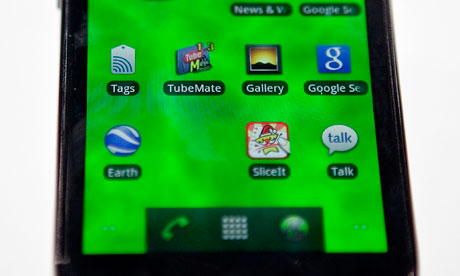AVG promises to protect privacy as well as detecting malware – and claims that Android mobile devices are just as vulnerable as Windows PCs

Android is the principal target for AVG's efforts with its new antivirus offering. Photograph: Bloomberg via Getty Images
AVG, an antivirus and security company which focuses on consumers and small businesses, held a press event in New York to announce its latest wave of products. I spoke to AVG's new CEO, Gary Kovacs, who comes from Mozilla, the company behind the Firefox browser. Why the move from the open web to the dark world of PC security?
"Mozilla's role was to try to be a standards bearer for the open web for everybody," he told me. At AVG he remains focused on being open, but with his attention now on privacy and transparency. Whether it is a social media platform like Facebook, or general web browsing, people have no idea what information they are sharing and with whom, he says, which deprives them of choice.
"The reason why we don't have choices today is that we don't have transparency and we don't have tools to be able to control those choices. Those aren't commercially available. This is going to be an exercise for AVG in delivering products that enable consumer choice around privacy and identity."
Among the products announced in New York is PrivacyFix, a free add-on for Google Chrome, Firefox, Android and iOS, that analyses Facebook, Google and LinkedIn settings, and checks web sites for advertising networks that track your browsing habits.
But do people care enough about privacy that they will pay for tools to manage it? PrivacyFix is free, but AVG's business model is "freemium", free products but with paid-for premium versions, and some commercial variant is likely in future.
"It will be marketable. It is starting to be marketable. But we're still in the very early stages of this evolution," says Kovacs. He speaks of a future "privacy tsunami" that will wake people up to what is happening to their privacy, in the same way that early PC malware created a market for antivirus products.
"I'm not sure exactly what, but stealing privacy, stealing identity, stealing personal financial data, we see a lot of that activity in the underground world. When I refer to a tsunami, it's going to be something of that nature that's going to come up. It will become very evident to people that they need to be thinking about their personal security," he says.
In the meantime though, to what extent is AVG's business model still built on mainly Windows antivirus and security, and how will it manage the transition to a post-PC world?
"I don't believe PCs are going to go away in the next three to five years. I believe they're going to be supplemented," says Kovacs. "But the big push for us, with 44 million downloads in the Google Play store, is antivirus and other products on Android. We're right in the middle of that transition." He adds that in future, cloud-based security and privacy tools that work across all devices "will make the platform discussion irrelevant."
AVG does not break down its revenue, but says its overall business is flourishing, with revenue for the second quarter of 2013 up 22%.
Users are all-too familiar with malware on their Windows PC, but one of the attractions of the new mobile platforms is that the more locked-down operating system and curatable app stores such as Apple's and Microsoft's, where any malicious apps that get through initial vetting should quickly be removed, means that malware is less likely and security software less necessary – or is that a false assumption?
"There is going to be some protection. I believe we're going to have to be thoughtful about security and how we update those products to make sure we're covered against the most recent threats," says Kovacs.
Marketing VP Judith Bitterli is even more insistent, saying that Android is just as vulnerable as a Windows PC. "We don't see the threat going down. I'm not being a fearmonger. We don't see the decline in the instances of malware," she tells me.
Marketing VP Judith Bitterli is even more insistent, saying that Android is just as vulnerable as a Windows PC. "We don't see the threat going down. I'm not being a fearmonger. We don't see the decline in the instances of malware," she tells me.
Is iOS more secure than Android? "I never worry too much about that question because it's an irrelevant question. Eighty-something percent of the world is on Android, so I need to envision how we protect on Android," says Kovacs.
No end to antivirus software, even in a post-PC world? It is a depressing thought; but to AVG's credit, its commitment to the freemium model means that a meaningful level of protection is available without charge.
first appeared on theguardian.com
No comments:
Post a Comment